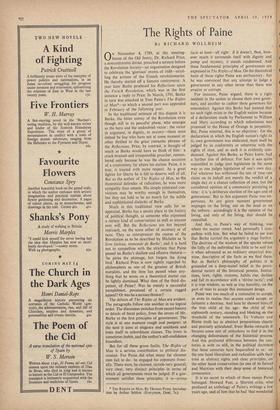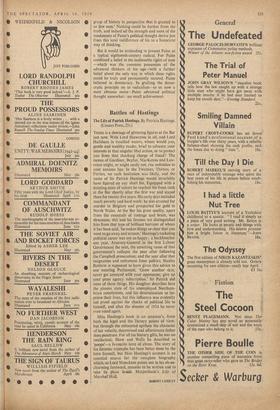The Rights of Paine
By RICHARD WOLLHEIM
ON November 4, 1789, at the meeting- house of the Old Jewry, Dr. Richard Price, a nonconformist divine, preached a sermon before the Revolution Society—an organisation designed to celebrate the 'glorious' events of 1688—extol- ling the actions of the French revolutionaries. He thereby started off a famous controversy. A year later Burke produced his Reflections upon the French Revolution, which was in the first instance a reply to Price. In March, 1791, Burke in turn was attacked in Tom Paine's The Rights of Man*—to which a second part was appended in February of the following year. In the traditional estimate of this dispute it is Burke, the bitter enemy of the Revolution even though still in its peaceful phase, who emerges as the hero and the undoubted victor : the victor in argument, in dignity, in oratory—there must indeed be few who have not at some moment or other thrilled to the great romantic phrases of the Reflections. Price, by contrast, is thought of much as Burke would have us think of him: a crack-brained and irresponsible preacher, remem- bered only because he was the chance occasion of a controversy far above his station. Paine, it is true, is treated with more respect. As a great fighter for liberty he is felt to deserve well of all. But as the author of The Rights of Man, as the theoretical defender of radicalism, he wins more sympathy than esteem. His simple reiterated con- victions may be worthy enough in themselves, but they are held to be no match for the subtle and sophisticated dialectic of Burke.
Much in this traditional view calls for re- appraisal. Burke has a secure place in the history of political thought, as someone who expressed a certain kind of conservatism as well as anyone ever will. But the Reflections are not beyond reproach, on the score either of accuracy or of taste. They so misrepresent the course of the Revolution as to be described by Michelet as 'le livre furieux, immonde de Burke'; and it is hard not to sympathise with the stricture that Paine passed on Burke's shallow and effusive rhetoric— 'he pities the plumage, but forgets the dying bird.' Richard Price is now rightly regarded by philosophers as one of the greatest of British moralists, and the time has passed when any- thing that he wrote on a theoretical matter can be lightly dismissed. What then of the third dis- putant, of Paine? Was he merely a successful pamphleteer, possessed of a certain rugged appeal? Or was he a serious thinker?
The defects of The Rights of Man are evident. The paragraphs follow one another in no logical order. The discussion switches from recent history to details of fiscal policy, from the errors of Mr. Burke to the first principles of government.. The style is at one moment rough and pungent; at the next it aims at elegance and antithesis and loses itself in subordinate clauses. The irony is sometimes feeble, and the author's self-confidence boundless.
But for all these grave faults. The Rights of Man is a serious contribution to political dis- cussion. For Paine did what many far cleverer men fail to do: he engaged his opponent front- ally. There were, he claimed, certain very general, very clear, very distinct principles in terms of which all governments must be judged. If a gov- ernment satisfies these principles, it is—prima * THE RIGHTS OF MAN. By Thomas Paine. Introduc- tion by Arthur Seldon. (Everyman, Dent, 7s.) facie at least—all right: if it doesn't, then, how- ever much it surrounds itself with dignity and pomp and mystery, it stands condemned. And these fundamental principles of government are expressed in The Rights of Man. On the theoretical basis of those rights Paine was perfunctory: but he was convinced that any attempt to judge a government in any other terms than these was evasive or corrupt.
For instance, Paine argued, there is a right resident in the nation to choose their own gover- nors, and another to cashier these governors for misconduct. Against this Burke had insisted that no such right exists in the English nation because of a declaration made by Parliament to William and Mary according to which submission was promised to the House of Orange in perpetuity. But, Paine retorted, this is no objection : for the declaration in which the English nation's right to it3 own government was abdicated, must itself be judged by its conformity or otherwise with the rights of man, and as such it is evidently con- demned. Against this Burke, as Paine knew, had a further line of defence. For him it was quite unjustified to judge past legislation in the same way as one judges legislation of one's own day. For whatever has withstood the test of time can claim on its behalf not merely the verdict of a single day or a chance collection of men, but the considered opinion of a community persisting in time: it is 'a deliberate election of the ages and of generations.' But to this argument Paine was im- pervious. At any given moment government impinges on the living, not on the dead or on the unborn: accordingly it. is the opinion of the living, and only of the living, that should be consulted.
And this, to Paine's way of thinking, was where the matter rested. And personally I sym- pathise with him. But what he failed to see was that Burke carried the argument a stage further. The doctrine of the wisdom of the species versus the folly of the individual has little to be said for it when advanced as an ordinary empirical doc- trine, descriptive of the facts as we find them. But in Burke's philosophy of politics it is grounded on a deep-seated belief in the provi- dential nature of the historical process. Institu- tions, laws, rights, customs, habits rise, decline and fall in accordance with a 'divine tactic'; and it is true wisdom, as well as true humility, on the part of man to accept this immanent design.
Paine was •too much of a rationalist to accept, or even to realise that anyone could accept, so fantastic a doctrine. And here he showed himself the true child of his age: the child of the eighteenth century, standing and blinking on the threshold of the nineteenth. To Voltaire and Hume truth lay in abstract propositions clearly and precisely articulated; from Burke onwards it became some sort of orthodoxy to find it in the changing deliverances of the historical process. And this profound difference between the cen- turies is with us still, in the political doctrines that these centuries have bequeathed to us: on the one hand liberalism and radicalism with their trust in abstract rights and clear principles, on the other hand conservatism (in one of its forms) and Marxism with their deep sense of historical immanence.
It is no secret to which of these camps Paine belonged. Howard Fast, a Marxist critic who produced an anthology of Paine's writings a few years ago, said of him that he had 'that wonderful
grasp of history in perspective that is granted to so few men.' Nothing could be further from the truth, and indeed all the strength and most of the weaknesses of Paine's political thought derive just from this total indifference of his to a historicist way of thinking.
But it would be misleading to present Paine as a typical eighteenth-century radical. For Paine combined a belief in the inalienable rights of man —which was the common possession of the advanced thinkers of his age—with a further belief about the only way in which these rights could be truly and permanently secured. Paine believed in democracy. In grafting the demo- cratic principle on to radicalism—to us now a most obvious move—Paine advanced political thought somewhat : no small achievement.















































 Previous page
Previous page